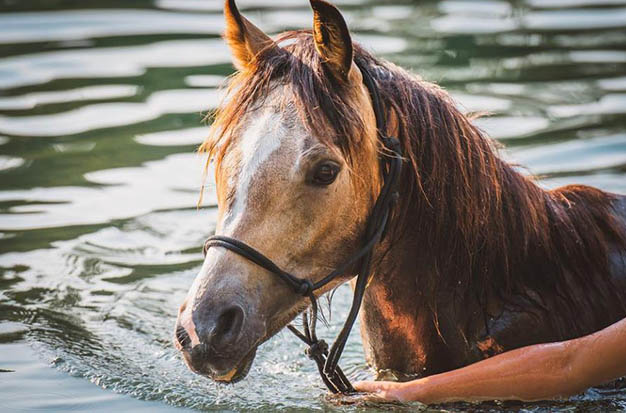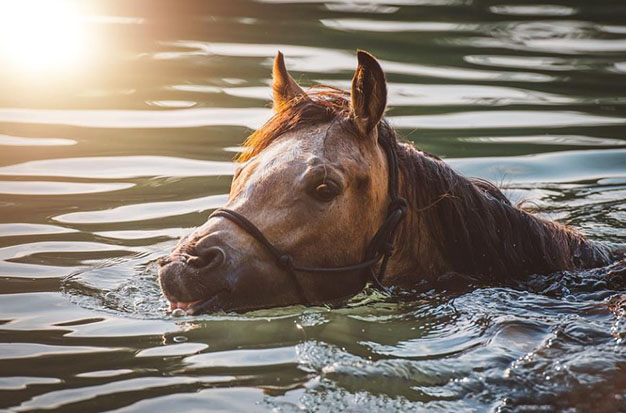Can Horses Swim? Everything You Should Know About Horses And Swimming
Does it really mix well for horses and water? I believe it’s a valid concern based on the tiptoeing and annoyed expressions horses have given me when asked to step through even the smallest rain puddles! What you should know about horses and swimming is provided below.
Horses can they really swim? Keep reading…
Can Horses Swim?
In the way that they paddle their legs while swimming, horses and dogs are similar. Large lungs also help horses stay afloat while swimming.
Most horses like the water and will swim on their own if they go beyond their comfort zone. However, some people might be initially apprehensive of the water, so it will take some time for them to become more comfortable.
How Do Horses Swim?
The natural instinct to swim in deep water exists in horses just like it does in many other mammals. When they used to live in the wild and had to cross rivers to avoid danger or get to better pastures, it is thought that they developed this ability. They were simply going about their daily business outdoors.
A horse will instinctively lift its head above the surface of the water to breathe when it is submerged in it, and its body will float as long as it maintains forward motion. To maintain balance and stability in the water, the legs will typically move in a paddle-like manner.
Horses find swimming to be physically taxing due to the inherent resistance water offers; it is common for them to breathe heavily during this type of exercise. The movement and breathing patterns of a horse while swimming is demonstrated in the video below.
It is important to be aware that horses cannot hold their breath in the same way we can. This indicates that the risk of drowning is very high if the horse’s head ends up in the water. Therefore, it’s crucial to take your time acclimating a horse to the water and swimming. Due to the unique anatomy of horse ears, which lack a lower passage for water to drain through, it is crucial to prevent water from entering this cavity as it could cause discomfort or even result in an ear infection.
What Advantages Do Horses Get From Swimming?
Swimming is a great form of rehabilitation and training for horses, as well as an enjoyable recreational activity.
Both humans and horses can benefit greatly from this type of low-impact exercise. The majority of horses exhibit a significant improvement in athletic performance and fitness when combined with groundwork. Aqua therapy is less likely to hurt horses because it has a low impact.
The muscles are used differently and from different angles during water exercises, which increases muscle mass, flexibility, and endurance while also enhancing joint range of motion. In comparison to conventional methods, working a horse in water can produce a stronger, more balanced horse with lower injury risks.
Swimming is incredibly helpful for enhancing flexibility, stride, endurance, and fitness. The horse works harder due to the water’s inherent resistance, which improves heart and lung function as well as muscle tone.
Rehabilitation is another purpose for swimming. For leg, tendon, and muscle damage, many veterinarians will advise hydrotherapy. This form of rehabilitation is extremely effective because it exercises the injury while putting no additional strain on the one that already exists.

What Is A Horse’s Fascination With Swimming & Do Horses Like To Swim?
A lot of horses are drawn to the water. By pawing at the water, rolling in the shallow areas, or even blowing bubbles, they may test the depth. It is undoubtedly not a “one size fits all” approach because horses are unique creatures.’ While some horses may enjoy swimming, others may not, and this could be for a variety of good reasons, including:
- Limited depth perception: Since horses cannot accurately perceive depth due to their natural limitations, they have no idea what they are walking into, which could be quite frightening for them.
- Bad Prior Experience: Some horses might have had a negative experience with water and view it negatively now.
- Simply put, they dislike getting wet! It’s as simple as that; just like other species of animals, they simply dislike being wet.
How Quickly And How Long Can A Horse Swim?
A horse can only swim at a maximum speed of about 4 km/h in the water, which is nowhere near as fast as it is on land.
Horses burn a lot of energy while swimming. In fact, swimming for 10 minutes can be as effective as cantering for several miles!
Estimating how long a horse can swim in open water is difficult because there are so many different variables. Additionally, it varies depending on the specific horse. Horses have large lungs that help them float, so they don’t have to expend a lot of energy trying to keep their bodies above the water. Instead, they use that energy to move forward. In comparison to a horse swimming against a current, one that is swimming slowly in calm water can swim for a longer period of time.
Horses have varying levels of fitness and abilities, so it’s important to watch out for signs of fatigue in your horse.
Does Swimming For Horses In The Ocean?
Swimming with your horse can be an amazing experience, but it can also quickly go very wrong. Horses can swim in the ocean. Here are a few things to consider before taking the plunge so to speak.
- How much water is in there? Whether there is a drop or an angle of equal height.
- The state of the ocean floor is it? Is it made of sand, stones, coral, etc.? Keep in mind that swimming on rough or hard surfaces could hurt the horse’s legs.
- If there are waves, avoid swimming in the sea if the waves are high enough to go over a horse’s head because horses cannot hold their breath.
- The current is it powerful? If so, stay on land or only move your feet. Still, you two can benefit from the restful break!
- Examine your surroundings. Are you causing a disturbance nearby or on the beach? Is it a public bathhouse? Think about other people.
- Rules and regulations. Are horses permitted, and are they permitted in the water? It’s important to pay attention to any pertinent signage because many public beaches have limitations.
- Remove the saddle and think about using a little less bridle. Make sure you remove ANY equipment that restricts the upward movement of the head as the horse needs free rein to hold it over the surface to breathe.
Swimming with your horse by yourself is not something we’d advise. It is safer to have two or more people in case something were to happen, to start with. Secondly, as horses are herd animals, it is easier to convince a hesitant horse to go into the water if it can follow another one.
Is A Horse Safe To Ride While Swimming?
It’s safe to ride a horse while it swims, and it’s thrilling to feel its strength propel you forward through the water. Still, we need to keep in mind that this is not his natural element and it is important to not hinder his movements and avoid getting in the way. If you choose to keep the bridle on, make sure you are not pulling on the rains while doing this. The mane can be used as support if you need to hold onto something.
Horses that swim become exhausted, so try to pay attention to your horse and remove it from the water while it is still energetic. Once you are done, reward him with some snacks and rest in the shade.
Conclusion
Swimming while riding a horse is undoubtedly possible because horses can swim and float by nature. Horses can benefit greatly from swimming in terms of fitness and recovery.
It’s a fantastic and unusual experience when done safely swimming while mounted. It is crucial to keep in mind that a horse’s individual abilities vary depending on relative factors and the swimming environment.
Read more about: Can Elephants Swim? Can Rabbits Swim? Is It Safe
